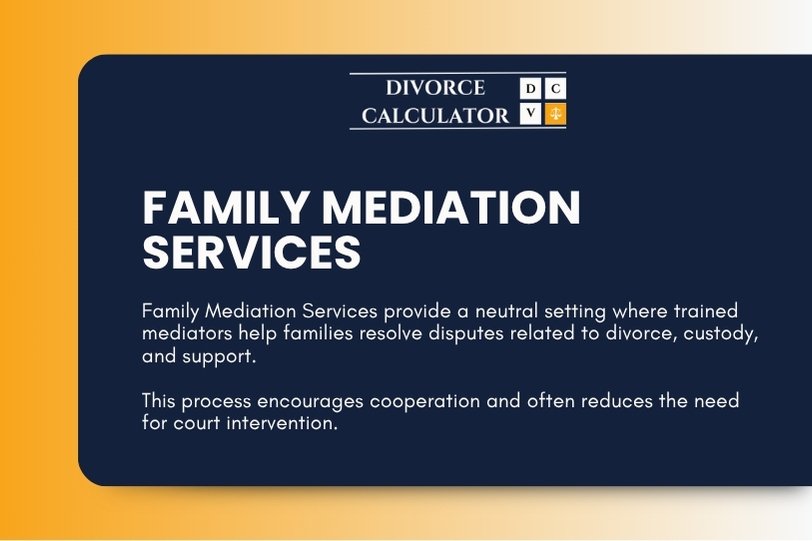Disagreements within families can be challenging, especially when emotions run high and communication breaks down. Family mediation services offer a structured, neutral space to resolve disputes efficiently and fairly. By choosing mediation, we empower ourselves to reach mutually agreeable solutions without resorting to lengthy and costly legal battles.
We often underestimate how helpful it can be to have a trained mediator guide these conversations. Family mediation is not just for high-conflict situations; it benefits anyone seeking clarity, understanding, and practical agreements on issues such as parenting, finances, or elder care. This approach ensures that everyone is heard and that the outcomes suit the family’s unique needs.
Key Takeaways
Family mediation gives us a structured setting to address conflicts and work toward agreements. By using a neutral third party, we can communicate more effectively and reduce misunderstandings.
We find that mediation often saves time and costs compared to court proceedings. This process usually encourages cooperation rather than confrontation.
Key Benefits:
- Improved communication
- Confidentiality in discussions
- Flexible and tailored solutions
- Reduced legal expenses
Common issues we resolve through mediation include parenting plans, financial settlements, and visitation arrangements. It’s helpful for us when all parties are committed to finding constructive solutions.
Not every dispute is suitable for mediation. Serious situations, such as domestic violence, require different resources.
We maintain control over outcomes in mediation rather than leaving decisions to a judge. Most agreements made through family mediation are voluntary and mutually agreed upon.

Why Family Mediation Services Matter In Divorce
When facing divorce, emotions can run high and communication often breaks down. Family mediation services help us find common ground and encourage respectful discussion during these challenging times.
We use mediation as an alternative to court proceedings, which can be lengthy, expensive, and stressful. Mediation offers a private setting where both parties work together with a neutral third party to resolve disputes.
Key advantages of family mediation:
- Reduces conflict and hostility
- Protects children from being caught in the middle
- Allows flexible solutions tailored to our unique needs
- Maintains a degree of control over important decisions
Instead of relying solely on legal judgments, we can express our concerns, explore options, and jointly create agreements that suit everyone’s interests. This process helps us move forward with less acrimony and more cooperation.
Mediation sessions are often scheduled at our convenience, making the process more accessible than formal court hearings. Cost savings are also significant, as mediation typically requires fewer billable hours than adversarial litigation.
By participating in family mediation, we have the opportunity to preserve important family relationships, even as household structures change. This approach supports respectful separation and creates a foundation for healthier co-parenting and communication in the future.
Real-Life Examples
We often guide families through challenging transitions. For instance, one couple facing separation used our mediation services to collaboratively develop a parenting plan. This helped their children maintain stability despite the family changes.
In another case, siblings were disputing over the care of an elderly parent. Through multiple sessions, we assisted them in drafting a shared caregiving schedule. This arrangement balanced their responsibilities and reduced tension in the family.
| Situation | Outcome |
|---|---|
| Divorce | Agreement on child custody |
| Elder care dispute | Collaborative care schedule |
| Property disagreements | Fair division of assets |
Sometimes we encounter families with long-standing communication breakdowns. By facilitating discussion in a neutral environment, we help them express concerns and listen to each other. As a result, disputes often become more manageable.
We have also worked with extended families addressing inheritance and property division issues. Using mediation, they found mutually acceptable solutions, often avoiding court proceedings.
Our experiences show that each family’s situation is unique, but structured mediation can support constructive resolutions.
How States Handle Family Mediation Services
Family mediation services differ widely based on state laws, court requirements, and available resources. Access, processes, and regulations often reflect local priorities and unique legal frameworks.
New York
In New York, most family courts provide mediation for issues such as custody, visitation, and support. Participation is frequently encouraged by judges, but not always mandatory. We see that the state maintains both court-connected mediation services and community-based centers.
Mediation sessions remain confidential and independent of court proceedings. Fees are often income-based, with some services offered at low or no cost for qualifying families. Mediators must complete specific training, but credentialing does not require licensing by the state.
When agreements are reached, mediators assist in drafting memoranda that parties may submit to the court. However, the court must approve and formalize agreements.
California
California operates an extensive network of county Family Court Services. Mediation is mandated for custody and visitation disputes before a judge hears the case. We notice that sessions are conducted by court-employed mediators who must hold advanced qualifications and state credentials.
California follows a “confidential” or “recommending” mediation system—counties choose based on local policy. In “recommending” counties, mediators report their conclusions to the court if parties can’t agree.
Services are generally free as part of the court process. Language assistance and remote access have expanded in recent years.
Texas
Texas emphasizes voluntary participation in mediation, but courts can order it for contested family law cases. The Texas Mediator Credentialing Association sets standards for mediator competence, but no state license is required.
We typically access both private practice mediators and court-affiliated programs, especially in larger counties. Fees vary but sliding-scale options may be available for low-income parties.
All mediated agreements must be written and signed to become binding. Texas law holds these agreements enforceable unless specific legal exceptions apply.
Florida
Florida adopts a structured system under the state’s Supreme Court mediation rules. Certified mediators handle most cases involving parenting, support, and property. Courts frequently order parties to attend mediation before trial and may provide the service in-house or by referral.
All family mediators must complete approved training and maintain certification with continuing education requirements. Fee schedules are standardized for court-provided services, with waivers possible for those who qualify.
In most circuits, mediation is confidential, and agreements go before a judge for final approval. We can access bilingual mediators and remote sessions depending on local court resources.
Tips If You’re Dealing With Family Mediation Services
When we prepare for family mediation, it helps to gather all relevant documents ahead of time. This includes financial records, communication logs, and any agreement drafts. Being organized can help us keep discussions focused.
We should enter mediation with an open mind. Listening carefully to all sides, even when we disagree, can help move the process forward. Let’s keep our communication respectful and clear throughout.
Here are some key points to remember:
| Tip | What To Do |
|---|---|
| Be Honest | Share information truthfully and openly. |
| Stay Respectful | Avoid interruption and keep a calm tone. |
| Set Goals | Know what outcomes we hope to achieve. |
It’s helpful to write down our questions or concerns before each session. This ensures we don’t forget important points.
If we need clarification at any point, we should ask the mediator directly. They are there to explain the process and help both sides understand their options.
Let’s remember that mediation is voluntary. We have the right to pause and reflect if we feel overwhelmed or need more information.
Frequently Asked Questions
We often encounter practical questions about the procedures, challenges, and limitations of family mediation. Understanding the distinct differences between mediation, therapy, and other legal processes helps set realistic expectations.
What are the common challenges faced during family mediation?
We notice that communication breakdowns and emotional tension are frequent barriers. Parties may also struggle with power imbalances and lack of trust. Differences in willingness to compromise often make resolution more difficult.
How can one access free family mediation services?
We can approach local community organizations and legal aid clinics, many of which offer free or low-cost mediation options. Sometimes, courts may refer families to government-funded mediation programs, especially in child custody or domestic disputes.
What should be avoided during child custody mediation sessions?
We recommend avoiding hostile language and personal attacks. Bringing children directly into the sessions or trying to manipulate their statements can harm the process. It’s crucial not to make threats or ultimatums.
How does family mediation differ from family therapy?
In family mediation, we focus on reaching practical agreements over conflicts like custody or property, using a structured negotiation process. Family therapy, on the other hand, centers on emotional healing and relationship improvement, not legal agreements or dispute resolution.
What is the typical process involved in family mediation for child custody?
We usually begin with an intake session to outline issues and set expectations. Next, joint sessions are held where mediators facilitate discussion and negotiations. If agreement is reached, the mediator may draft a written settlement for both parties to review.
What are the potential drawbacks of engaging in family mediation?
We recognize that mediation may not be suitable for cases involving abuse or severe power imbalances. Sometimes, neither party is willing to compromise, which can stall progress. The process is also not legally binding unless formalized in court.



